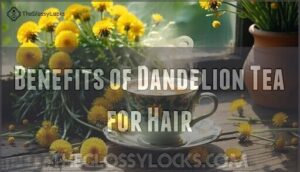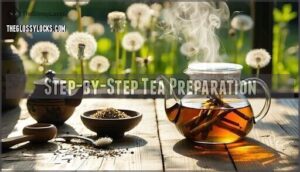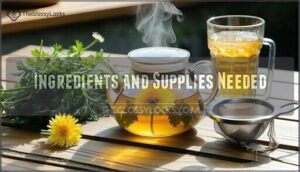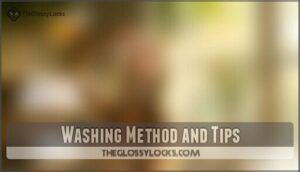This site is supported by our readers. We may earn a commission, at no cost to you, if you purchase through links.
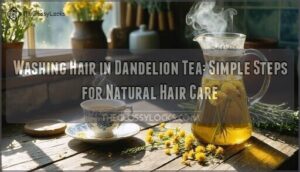
Start by brewing a strong tea with dried dandelion root or leaves, then let it cool completely.
Once your hair is freshly shampooed, pour this herbal rinse through from roots to tips.
This time-tested herbal remedy confronts common scalp issues like dandruff and excess oil production, delivering nutrients directly to your hair follicles. The process transforms an everyday garden "weed" into a powerful hair care ally that your grandmother might have sworn by.
Table Of Contents
- Key Takeaways
- What is Washing Hair With Dandelion Tea?
- Benefits of Dandelion Tea for Hair
- How to Prepare Dandelion Tea for Hair
- Step-by-Step Guide to Washing Hair
- Safety, Risks, and Market Trends
- Frequently Asked Questions (FAQs)
- How often should dandelion tea be used for hair washing?
- Are there any precautions to take when using dandelion tea on hair?
- Are there any natural alternatives to dandelion tea for hair washing?
- Are there any benefits to using dandelion tea for hair washing?
- How long before seeing dandelion hair results?
- Does dandelion tea work on chemically treated hair?
- Can you combine dandelion with other herbs?
- Is dandelion tea safe during pregnancy breastfeeding?
- Conclusion
Key Takeaways
- Natural scalp healing: Dandelion tea’s anti-inflammatory compounds and rich vitamin content (A, C, E, B-complex) soothe irritated scalps while addressing conditions like dandruff and seborrheic dermatitis without harsh chemicals.
- Oil control and cleansing: The herb’s natural antifungal properties help rebalance the scalp microbiome and regulate sebum production, making it effective for managing greasy roots and stubborn flakes.
- Hair growth support: High concentrations of potassium boost scalp circulation, while vitamins and minerals strengthen follicles, with studies showing dandelion extract can increase follicle density and help regulate hair loss factors.
- Simple preparation method: Brew strong dandelion tea using one tablespoon of dried root per cup of boiling water, steep for 10-15 minutes, then use as a final rinse after shampooing 1-2 times weekly for best results.
What is Washing Hair With Dandelion Tea?
Dandelion tea hair washing swaps your regular shampoo for brewed dandelion roots or leaves.
People have used this gentle herbal method for generations to tap into the plant’s vitamins, minerals, and anti-inflammatory benefits while cleaning away buildup and excess oil.
The dandelion’s natural compounds work to soothe your scalp while lifting away product residue and extra oils that weigh hair down.
Definition of Washing
Most people think washing means grabbing soap and scrubbing away, but there’s actually more to it than that.
Washing is really about removing whatever shouldn’t be there—and sometimes plain water does the trick just fine, or you might combine it with natural ingredients that boost the cleaning power.
When you think about washing, your mind probably jumps straight to soap and water, but this simple act of cleansing goes deeper than just getting rid of dirt. The definition of washing encompasses any cleansing action that removes impurities, whether through water properties alone or combined with other natural elements.
Throughout Washing History, various Cultural Practices have embraced Washing Variations for hair care, from clay treatments to herbal rinses like dandelion tea.
Herbal Hair Remedies Overview
Your grandmother’s medicine cabinet might’ve been onto something—herbs have been nurturing hair health for centuries, long before synthetic shampoos ever hit the shelves. These natural remedies work by addressing scalp conditions at their root, providing gentle yet effective benefits of herbs for hair without harsh chemicals.
- Rosemary and saw palmetto target DHT-related hair loss
- Aloe vera soothes inflammatory scalp conditions
- Amla delivers antioxidant protection for stronger strands
- Traditional remedy preparation methods preserve active compounds naturally
Dandelion Tea Explained
Most people overlook the humble dandelion as just another pesky weed, but this golden-flowered plant holds centuries of wisdom for hair care that modern science is finally catching up with.
Dandelion tea utilizes the plant’s remarkable nutritional profile, delivering concentrated tea antioxidants and vitamin density that your scalp craves. The root minerals work alongside scalp healing compounds to provide inflammatory relief, making this herbal tea a powerful addition to any hair care routine focused on scalp health and hair growth.
Vitamins
Minerals
Benefits of Dandelion Tea for Hair
Dandelion tea brings a powerhouse of vitamins, minerals, and antioxidants directly to your scalp and hair follicles.
This humble weed’s anti-inflammatory properties can soothe irritated scalps, while its rich nutrient profile encourages stronger, healthier hair growth from root to tip.
Nutritional Properties of Dandelion
Dandelion leaves pack way more nutrition than you’d expect from such a common weed.
Each 100g serving gives you nearly 3 grams of protein and almost 3 grams of fiber – numbers that beat most vegetables you’ll find at the grocery store.
Within dandelion’s unassuming leaves lies an impressive Macronutrient Profile that promotes healthy hair from within. This common plant delivers 2.91g protein and 2.70g fiber per 100g, surpassing most vegetables in nutrient density.
Vitamin Abundance shines through with over 30% daily vitamin A requirements, plus substantial vitamin K, C, and B-complex vitamins. The Mineral Composition includes 147mg calcium, 3.10mg iron, and 397mg potassium per serving.
Rich Antioxidant Capacity from beta-carotene and polyphenols helps protect hair follicles, while the high Fiber Content promotes overall wellness that reflects in your hair’s vitality. Dandelion also contains compounds like taraxasterol, which may contribute to its anti-inflammatory effects.
Scalp Health and Inflammation
Here’s how dandelion root actually helps your scalp: compounds like taraxasterol dial down inflammation by tweaking the pathways that cause irritation.
This means less redness and irritation from conditions like seborrheic dermatitis and eczema.
Dandelion root’s anti-inflammatory compounds, like taraxasterol, work by regulating inflammatory pathways in your scalp. These natural mechanisms help soothe inflammatory scalp conditions such as seborrheic dermatitis and eczema.
The antioxidant activity from vitamins C and E strengthens your scalp’s barrier function, while immune modulation reduces hypersensitivity reactions that can worsen existing scalp conditions. Dandelion’s properties can also minimize dark spots on the scalp.
Dandruff and Oil Control
If you’ve ever dealt with greasy roots or stubborn flakes that seem to multiply overnight, dandelion tea might be your scalp’s new best friend.
The herb’s anti-fungal properties help rebalance your scalp microbiome while natural cleansers gently regulate sebum production.
Its antiinflammatory compounds tackle scalp irritation and various scalp conditions, creating an environment where dandruff can’t thrive.
Hair Growth Support
You’ll find that dandelion tea’s rich nutrient profile directly aids follicle health and natural hair growth treatments. The root’s high concentrations of vitamins A, C, and E boost nutrient delivery to your scalp, while potassium boosts scalp circulation for prime root activation.
Studies show dandelion extract increases follicle density and helps regulate hair loss factors, making this herbal remedy particularly effective for strengthening weakened follicles.
How to Prepare Dandelion Tea for Hair
Want to make dandelion tea for your hair? You’ve got two main options. Hunt for fresh dandelion leaves and roots yourself—just make sure you’re picking from clean spots away from roads and chemicals. Or skip the foraging and grab some dried dandelion from a trusted herb supplier.
Either way works, but dried gives you more predictable results.
Making dandelion tea for hair care starts with choosing quality ingredients and following proper brewing techniques. You can use fresh dandelion leaves and roots from clean areas or purchase dried dandelion from reputable herbal suppliers for consistent results.
Sourcing Fresh or Dried Dandelion
Your local park might hold the secret to your healthiest hair yet – those golden weeds you’ve been avoiding could be your scalp’s new best friend.
Wildcrafting dandelion requires identifying pesticide-free areas away from roads and dog parks. You’ll want both dandelion root and leaf for greatest benefits.
Organic suppliers offer pre-dried options if foraging isn’t feasible. Quality matters – choose suppliers specializing in Organic Roasted Dandelion Root tea for convenience.
Step-by-Step Tea Preparation
Once you’ve gathered your dandelion materials, brewing the perfect hair-nourishing tea becomes as simple as steeping your morning cup.
For dandelion root tea, use one tablespoon of dried or roasted dandelion root per cup of boiling water. Let your herbal tea recipe steep for 10-15 minutes—this infusion time extracts the most nutrients. Strong tea strength works best for hair washing, so don’t worry about over-brewing.
Optional Dandelion Oil Infusion
While tea offers quick results, creating your own dandelion oil takes patience but rewards you with a concentrated powerhouse for scalp nourishment.
Pack fresh dandelion flowers in sterile glass jars, cover with vegetable oil, and let sunshine work its magic for two weeks. This DIY oil recipe creates potent herbal remedies for hair with enhanced infusion benefits.
Store properly and customize scent with essential oils for individual skin care applications.
Step-by-Step Guide to Washing Hair
Your dandelion tea works as a natural cleanser that feeds your scalp with vitamins and minerals while gently washing away buildup.
This gentle washing method utilizes dandelion’s nutrient-rich properties to cleanse your scalp while delivering vitamins and minerals directly to your hair follicles.
Ingredients and Supplies Needed
Getting your hands on the right materials doesn’t require a trip to some mystical apothecary—most of what you need is probably sitting in your kitchen right now. You’ll want fresh or dried dandelion leaf, clean water (filtered works best), a teapot or large mug for brewing, and a strainer.
Storage containers help preserve leftover tea, while optional additives like honey can improve your herbal remedies experience.
Washing Method and Tips
Think of this process like tending a garden—gentle movements and patience yield the best results when applying your dandelion tea rinse to your hair. Start with lukewarm water temperature to preserve the natural herbs’ benefits while washing. Use application techniques that focus on scalp massage with circular motions to boost circulation.
- Rinse duration: Pour the cooled dandelion tea slowly through your hair, letting it saturate for 3-5 minutes
- Product pairing: Apply after your regular shampoo but before conditioner for peak herbal remedies absorption
- Hair growth tips: Focus the scalp massage on areas needing extra attention during dandelion tea preparation application
Frequency and Aftercare
Like any good habit, consistency with dandelion tea hair washes matters more than intensity. Start with weekly washing frequency, then adjust based on your scalp’s response.
After each wash, follow up with scalp hydration using natural oils or leave-in treatments. These herbal remedies for hair work best when paired with complementary hair growth tips throughout your hair cycle.
Safety, Risks, and Market Trends
Dandelion tea has gained attention for its natural benefits for hair care, but like any herbal remedy, it comes with considerations you should know about.
The shift toward natural hair products shows people are becoming more conscious consumers, though using these remedies effectively means understanding both benefits and potential drawbacks.
The growing trend toward natural hair products reflects consumer awareness, but smart usage requires knowing when to proceed with caution.
Possible Side Effects and Interactions
Dandelion carries real risks that shouldn’t be overlooked. Allergic reactions affect about 8.5% of people with respiratory allergies, causing scalp redness, itching, or swelling. Skin irritation can worsen existing eczema or sensitive skin conditions.
Drug interactions pose concerns too—dandelion may interfere with blood thinners, antibiotics, and heart medications. Some experience systemic reactions like dehydration from its diuretic effects.
Who Should Avoid Dandelion Tea
Not everyone can jump into the dandelion tea hair care routine without a second thought. Pregnancy safety remains unclear, so expecting mothers should avoid dandelion tea.
Those taking blood pressure medications, diuretics, or diabetes treatments face serious medication interactions. People with hormone-sensitive conditions should also steer clear.
Anyone with existing conditions or allergy concerns needs medical guidance before trying this natural remedy.
Natural Hair Care Market Trends
People are ditching chemical-heavy products for natural alternatives, and the hair care industry is riding this wave. More folks are learning about the risks that come with synthetic ingredients, plus there’s growing interest in herbal solutions for hair loss.
What’s driving this shift? Natural herbs packed with antioxidants are becoming the stars of new products. Meanwhile, stricter regulations are pushing brands to be more transparent about what’s actually in their bottles.
Europe’s leading the charge here, capturing 38% of the market. European consumers are particularly focused on finding eco-friendly options that actually work for hair growth.
Regional analysis reveals Europe leading with 38% market share, driven by eco-conscious consumers seeking effective hair growth solutions.
Frequently Asked Questions (FAQs)
How often should dandelion tea be used for hair washing?
Ironically, many people rush into daily herbal remedies when less proves more effective.
For washing frequency with dandelion tea, start twice weekly to assess your hair type’s response. Best duration allows scalp absorption while preventing over-cleansing that strips natural oils.
Are there any precautions to take when using dandelion tea on hair?
Before diving into dandelion herbal remedies, you should know about potential allergy concerns and scalp sensitivity reactions that can occur with any natural treatment.
- Allergy Concerns: Test dandelion tea on a small skin patch first, as some people react to plants in the asteraceae family
- Scalp Sensitivity: Start with weaker tea strength to avoid irritation, especially if you have existing scalp issues
- Product Interactions: Avoid mixing dandelion treatments with other active hair loss products without consulting a professional
- Usage Frequency: Limit washing to 1-2 times weekly initially to gauge your scalp’s response to this herbal remedy
- Health Benefits vs. Risks: Those with gallbladder conditions or taking blood thinners should consult healthcare providers before use
Are there any natural alternatives to dandelion tea for hair washing?
Several herbal infusions offer excellent alternatives for natural hair washing. Rosemary oil stimulates circulation, while soap nuts provide gentle cleansing.
Clay washes remove buildup, vinegar rinses restore pH balance, and ayurvedic herbs like amla nourish follicles naturally.
Are there any benefits to using dandelion tea for hair washing?
What’s special about dandelion varieties is their potent antioxidants that work wonders for your scalp. The antioxidants present in dandelion tea combat free radicals, which can damage your hair over time, while rinsing hair reduces oiliness and promotes scalp health.
- Rich nutrient profile: The rich vitamin and iron content improves the health of your hair by daily consumption
- Scalp absorption benefits: These promote scalp health by reducing oxidative stress and cell damage caused by free radicals
- Tea effectiveness for hair loss: Its high vitamin and mineral content helps strengthen hair follicles, stimulate growth
- Long-term effects: Regular use can result in shinier, healthier hair with fewer split ends
- DIY recipes potential: Hair Rinse: Rinse hair to reduce oiliness and promote scalp health
How long before seeing dandelion hair results?
Patience is important when expecting dandelion hair results. Many customers see noticeable results in two weeks or less with commercial dandelion products, though Growth Rate Factors affect your Visible Changes Timeline. Your Hair Type Matters greatly—fine hair may show scalp improvements faster than thick hair.
Realistic Expectations include reduced dandruff and improved scalp health within the first month, while hair growth benefits generally require 4-8 weeks of Consistent Use Impact. The antioxidants in dandelion work gradually to address hair loss concerns.
| Timeline | Expected Changes |
|---|---|
| 1-2 weeks | Scalp feels healthier, less oily |
| 3-4 weeks | Reduced dandruff, softer hair |
| 6-8 weeks | Improved hair strength |
| 2-3 months | Noticeable growth assistance |
Does dandelion tea work on chemically treated hair?
Breakage risks multiply when dandelion’s antioxidants meet chemically altered hair strands. The herbal treatment works but requires caution—color fading and perm damage increase with frequent rinses.
Can you combine dandelion with other herbs?
Looking for more powerful natural hair care solutions, herbal synergy creates wonderful results when dandelion teams up with complementary plants.
Combining dandelion with other natural herbs amplifies benefits through Ayurvedic practices and time-tested herbal remedies for ailments:
- Rosemary benefits: Mix with dandelion tea for enhanced circulation and anti-inflammatory scalp care
- Amla combination: Blend these vitamin C powerhouses for stronger antioxidant protection and shine
- Saw palmetto: Pair with dandelion to address DHT-related hair thinning more effectively
- Aloe pairing: Combine dandelion’s nutrients with aloe’s soothing properties for sensitive scalps
- Nettle addition: Create a mineral-rich herbal tea recipe that nourishes follicles deeply
Is dandelion tea safe during pregnancy breastfeeding?
Expecting mothers face endless worry about every sip and supplement, and dandelion’s medicinal properties during pregnancy create genuine dosage concerns. There isn’t enough reliable information to know if dandelion is safe during pregnancy or breastfeeding, though breastfeeding use is unlikely to harm infants.
Consult healthcare providers before using herbal remedies for detoxification.
Conclusion
Embracing nature’s wisdom transforms your hair care routine from chemical dependency to botanical freedom. Washing hair in dandelion tea offers a gentle, time-tested approach that nourishes your scalp while addressing common concerns like excess oil and irritation.
This simple herbal practice connects you to generations of natural wellness traditions, proving that effective hair care doesn’t require harsh ingredients—just the humble dandelion’s striking healing properties.
Effective hair care doesn’t require harsh chemicals—just the humble dandelion’s natural healing wisdom passed down through generations
- https://www.theherbcottage.com/guest-post-plant-power-7-miracle-herbs-for-hair-growth/
- https://www.curlynikki.com/is-dandelion-root-good-for-you.html
- https://www.tea-and-coffee.com/blog/dandelion-tea-benefits
- https://patents.google.com/patent/WO2008043644A2/en
- https://pmc.ncbi.nlm.nih.gov/articles/PMC12383382/

